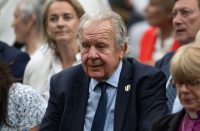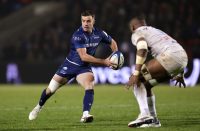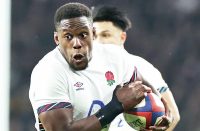 The last round of Wallaby jaw-jaw before the battle for the 2013 Test series came to a climax at the ANZ Stadium in Sydney yesterday saw Will Genia exude that confidence that leaves the Aussies shell-shocked when they lose, or with an even more cocksure swagger if they win.
The last round of Wallaby jaw-jaw before the battle for the 2013 Test series came to a climax at the ANZ Stadium in Sydney yesterday saw Will Genia exude that confidence that leaves the Aussies shell-shocked when they lose, or with an even more cocksure swagger if they win.
As one Australian scribe wrote pointedly before the second Test in Melbourne, with the British habit of turning defeat into something glorious in his sights: “This country doesn’t celebrate gallant second placings.”
That will-to-win was typified by Genia’s refusal to buckle under the pressure of having to square the series. It was the scrum-half’s India-rubber flexibility, quicksilver speed around the base, allied to exquisite judgment, that was the difference between Australia living to fight another day in Melbourne, or going to hell on a superhighway of recrimination.
As Genia fielded questions at the Shangri-La Hotel in Sydney’s downtown Rocks district on Friday morning he was the picture of a self-assured athlete at the top of his game.
He took the first question about supposedly playing the series on one leg, because of a knee injury, without breaking stride. “The knee has given me no trouble at all – it was not an issue. I had my knee strapped, and I guess it did the job.”
It was delivered deadpan, but it had all the hallmarks of Australian one-upmanship, the implication being that if this is what he can do on one leg, God help the opposition when he’s got two working properly.
Genia acknowledged that the Lions had a potential third Test game-changer with Jamie Roberts returning from his hamstring injury, but it was also clear that the prospect of the big Welshman tilting at the Wallaby backline did not have him in anything approaching a sweat.

Roberts might be seen as the midfield Panzer tank around which Warren Gatland‘s big assault force revolves, but Genia was matter-of-fact in his summary.
“He’s big, hard to stop, so big we have to make sure someone goes high and someone low. We want to stop him getting over the gain-line.”
That precious gain-line has been the most decisive component on this tour. When the Lions crossed it consistently they looked unstoppable – but when they failed, their game became alarmingly one-dimensional.
Unfortunately, the overwhelming importance of a big midfield carrier for the Lions preferred game-plan, dubbed ‘Warren-ball’, became apparent only when the non-games at the start of the tour, against the Barbarians and the Western Force, were finished with.
The loss to the Brumbies and the lack of attacking verve in the second Test were the worst examples, with the Lions pressed into playing kick-chase and having no Plan B.
By contrast, the wins over the Reds and the Waratahs on consecutive weekends were the high points. The Reds attempt to blitz the Lions by playing with such sustained pace and intensity in the first half that the tourists were unable to live with it, eventually backfired – and it was the Queenslanders who ran out of gas first.
However, there was a price to pay with Manu Tuilagi (shoulder) – the only other centre with the physical presence to do the same job as Roberts – and Tommy Bowe (hand) requiring medical treatment that kept them out of action for the best part of three weeks.

If Tuilagi’s injury was a blow, the one that Roberts sustained when he tore his hamstring the following weekend against the Waratahs, was a disaster. Not only had Roberts and Jonathan Davies combined brilliantly in midfield in the best performance of the tour, it had also given Gatland his centre combination for the Test series.
Then, in one fell swoop, in the final quarter of the Waratahs match, the Lions head coach had to make new plans with Roberts ruled out of action for the first two Tests, and Tuilagi not yet fit to step into the breach.
The lack of a slick Plan B reflects more than anything on the way in which the whole tour itinerary, and the preparation time before the Lions were left our shores, were shaved back to the bare minimum.
Everybody in the professional tiers of British and Irish rugby, including national unions and major club organisations such as those responsible for the English Premiership and the Celtic Rabodirect Pro12 leagues, shares the blame for that paucity of preparation.
Their unwillingness to move their finals forward by a week gave the Lions coaches an almost impossible task in terms of developing multiple tactical approaches in such a short time frame.
Gatland cut his cloth accordingly, opting for a round the corner assault, utilising big runners, as a chosen weapon – and one he could teach his players to wield in a short time-frame.
However, due to injuries, he was unable to field the power midfield he wanted most until the final Test. It is almost incomprehensible that the Lions administration agreed to play a tour opener in the sapping heat of Hong Kong against a barely competitive Barbarians side. The benefits were minimal, and were outweighed massively by the alternative of playing an extra game in Australian conditions.
That serious planning oversight was compounded by the failure of Lions officials to ensure that the Australian Super franchises fielded their strongest possible teams. One of the biggest debits to emerge from the 2013 Lions tour was the continuation of the scorched earth policy adopted by the SANZAR unions.
Since 1997 the host nations have withdrawn their Test players from the provincial sides on the Lions itinerary, and, in the process, have turned the non-Test games into a virtual procession.
Credit the Brumbies for bucking the trend with a largely reserve side, which showed more passion and drive than a Lions outfit struggling to find cohesion after including multiple new arrivals.
It was not a happy Lions baptism for Ryan Grant, Billy Twelvetrees, Brad Barritt or Christian Wade, although some of them got the chance to make amends against an outclassed Rebels side.

However, what was glaringly apparent from the Brumbies game through to the defeat in Melbourne, was that predictions that the Lions pack would dominate Australia at the set-piece were a long way wide of the mark.
Clearest of all was not just the gap between most of the first string Test starters and their bench replacements, but the failure of the bigger heavier forwards, such as locks Ian Evans and Richie Gray, to muscle their way into Test contention.
For instance, Evans, touted as a Test lock before the tour, failed to make the 23 for any of the Tests, even after Paul O’Connell broke his arm in the first Test. He lost out to Geoff Parling, and yet his ballast was missed when the Lions were persistently pressured on their own ball in the second Test.
With Tom Croft also out of favour, the Wallabies undoubtedly benefited from the disciplinary reprieve given to their main lineout forward, driving force, and captain, James Horwill, after being cited for stamping on Alun Wyn Jones in the Brisbane opener.
The Lions also had recurrent problems on the loose-head side of the scrum. It resulted in Gatland’s side coming within a Kurtley Beale slip of losing a spectacular first Test, which showcased two brilliant wing talents, with George North and Israel Folau claiming spectacular solo tries.
Back to the forwards. Despite Mako Vunipola’s outstanding work in the loose, it was always likely to be a bridge too far to ask a first-season Premiership rookie to prop up the left side of the Lions Test scrum. Vunipola battled valiantly as a replacement for Alex Corbisiero in the first Test, and as a starter in the second, but the truth is that the Lions struggled to establish the solid platform they needed.
Graham Rowntree, the Lions forwards coach, decided from a long way out that Andrew Sheridan was not the answer. His was a minority view, and a Test Lion who would undoubtedly have answered the call, never received it.
While Sheridan was enjoying his summer break the Lions courted controversy by choosing to spend the main part of the week before the third Test enjoying some R&R in Noosa, an upmarket resort on Queensland’s Sunshine Coast.
Sir Clive Woodward said it was “the last place” the Lions should have gone.
Andy Irvine, the Lions manager, hit back by saying that recreation involving beach and watersports, as well as a few beers, were the ideal antidote to the disappointment of Melbourne.
The Lions management were also mindful that at the end of a marathon European season, rest and a few diversions might help preparation. This was a message echoed by some of the 2001 Lions, with anecdotes of the detrimental effects of Graham Henry flogging them in training.
Then came the bombshell. No sooner had Irvine ramped up the ante by stating how much the Lions would miss injured captain Sam Warburton ahead of “one of the biggest games the Lions have played in 30 to 40 years”, than Gatland announced that Brian O’Driscoll – the veteran many expected to replace him as skipper – had been dropped from the Test 23 for the Sydney showdown. (See Cain’s comment, Page 19).
A few hours after the Irish legend was demoted, Australia counter-attacked. They announced that they were recalling a veteran of their own, with 32-year-old George Smith selected at openside almost four years after winning the last of his 110 caps. Whatever else is said of the 2013 Lions tour – of its highs and lows, and contradictions – one thing can be said with certainty. There were not many dull moments.






















